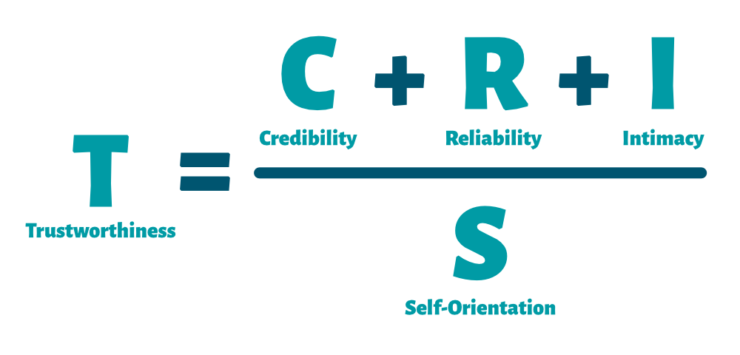In this post, I’ll present to you a very interesting equation from the book The Trusted Advisor. The book in question has been on the reading lists of quite a few consultants and I’m rather dismayed that I only found it a couple of years ago. In any case, this equation for trustworthiness is so simple it’s genius, and that’s why it’s a rather useful tool.
What is trustworthiness made of?
In this context, I define trustworthiness as how trustworthy your current or potential client thinks you are. So, if you’re client was asked right now how reliable they think John or Jane is, that would be the estimate they’d come up with on the fly. What factors affect that estimate?
The Trusted Advisor gives trustworthiness the following equation:

To put it plainly, trustworthiness is the sum of credibility, reliability and intimacy, divided by self-orientation.
How do you interpret the trust equation?
Credibility is about whether the client thinks you’re qualified, convincing and capable in your role. Reliability (a different sort of trustworthiness) measures whether the client can trust that you’ll do what you promised when you promised to do it. Intimacy is all about the client’s feeling about whether it’s easy, pleasant – or even possible – to talk to you about everything, especially the hard stuff.
All of these characteristics are evaluated on a scale from one to ten. Those numbers are then added together, with the end result being something between 3 and 30. After that we’ll consider whether the client believes you care more about their business than yours. So: how selfish, greedy, putting-yourself-first, self-centred, disinterested in the client’s problems does the client think you are? The bleaker that evaluation is on a scale from 1 to 10, the larger is the number the earlier sum is divided by.
So, for example, if
- the client would rate my credibility and knowhow as moderate (7)
- the client knows that I’ll always deliver on time and as agreed (10)
- and that I’m very approachable but still a bit of an unknown quantity (6)
- and the client doesn’t yet know how much I care about them – but I don’t seem like a super slimy snake oil seller (5)
- the final value for trustworthiness is (7+10+6)/5 = 4.6
What’s this thing good for?
This equation has two hugely important parts! Firstly, it focuses our attention once again on why pure facts aren’t enough. By arguing our case, knowing the theory and reasoning convincingly, we raise our credibility and also slightly our reliability. However, that does nothing for intimacy or the client’s estimate of our self-orientation.
If your competitor has experts that know their facts just as well but can also get to know the client on a human level and talk about the difficult things, the client is going to trust the competitor’s experts more.
Secondly, the equation demonstrates very effectively that it’s just as important, if not more important, to genuinely care about your client as it is to try to be The Best Expert in the World. Even if your credibility is top-notch and your reliability off the charts, if the client doesn’t believe that you care about them and their problems, the end result will end up being a somewhat sorry figure. It’s comparatively easier to lower self-orientation than it is to raise credibility.
Who cares, it’s almost Friday…
So it is! However, the same equation works just as well with relationships outside of work. Similarly, your relationships with your friends, family members and relatives will get stronger when you
- are interesting and interested in what’s going on in the world so that people can talk to you about stuff
- you do what you promised, when you promised you’d do it
- you don’t shy away from difficult topics and dare to be yourself, vulnerable and intimate with the other person
- and you care about them and their stuff.
You can achieve all that by regularly asking someone, “How are you”, “Can I help you” and “What do you think?” Or what do you think?